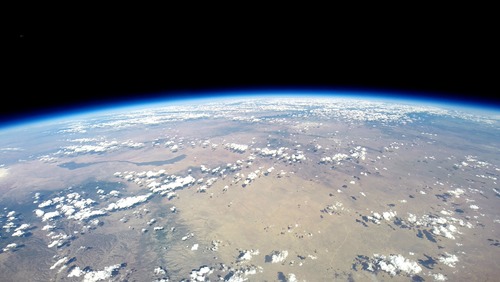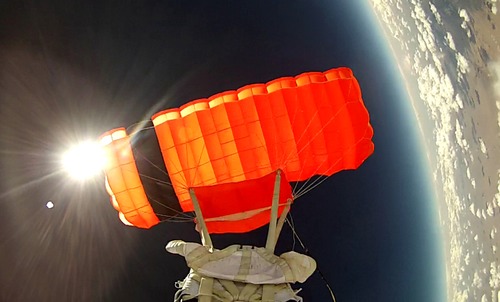
A view of the Earth taken from an altitude of 36 kilometers (120,000 feet) on a World View test flight June 18. The company plans to offer similar views to customers of its balloon flights, which will be licensed as launches, starting in late 2016. (credit: World View)
World View Enterprises, the company that revealed plans last year to fly customers into the upper stratosphere and do so licensed as a launch vehicle, announced a milestone in its vehicle development Tuesday with a successful high-altitude test flight of a 10% scale model of that system.
The test vehicle, called Tycho, flew to an altitude of 36 kilometers (120,000 feet) on a balloon flight June 18 that lifted off near Roswell, New Mexico. The vehicle then descended to 15 kilometers (50,000 feet), where it deployed a parafoil to glide the rest of the way back to the surface. That flight, the company said, set the record for the highest parafoil flight ever.
World View officials said they were pleased with the test, particularly with the performance of the parafoil. “We were really surprised at how well it flew,” said Taber MacCallum, chief technology officer of World View, in an interview late Monday. “We had a good deployment and a very stable flight, so we were thrilled.”
MacCallum said the World View team was still “crunching data” from the flight, but noted it was likely the company would follow up this flight with another of the same system, this time deploying the parafoil from an altitude of 30 kilometers (100,000 feet). That would test the “emergency abort” scenario of the full-scale system where the vehicle has to leave the balloon without descending.
After that, he indicated World View would likely move head with a full-sized system. “On the balloon side, it’s pretty scalable” to a full-size system, he said. “The 10-percent parafoil is numerically scalable and the control system is the same, with different software settings. So we think right now we can do a 10-percent to full-scale jump, but looking at the data and maybe some more test flights will let us know for sure.”

A parafoil deployed on World View’s June 18 test flight. The flight set a record for the highest flight of a parafoil. (credit: World View)
Tycho, which weighs a couple hundred kilograms and is the size of a small refrigerator, was developed for this test flights, but MacCallum said they’ve received interest in flying it for research and technology demonstration. “It looks like that, early on, we could be in the business of doing experiments and test flights,” he said. There is particular interest, he said, in flying instruments to raise their technology readiness level for later spaceflight applications.
The main business of World View, though, remains flying people (they call their customers “Voyagers”) to high altitudes to experience views of the Earth not dissimilar to those from space. The World View press release said those flights are scheduled to begin in 2016, although MacCallum said Monday it’s likely to be very late in 2016 before commercial flights would begin. “We’ve sold our first few flights,” he said, adding he expected sales to increase as World View transitioned from a concept to actual flight hardware, as has been the case for suborbital vehicle developers. “We’re happy with the response we’re getting.”
MacCallum said those commercial flights will likely take place from several locations in the American Southwest, because of shifting winds. One location they’re particularly interested in is Page, a town in northern Arizona east of the Grand Canyon that is a popular location for balloonists. “When you talk to balloonists, they all swoon over Page,” he said, because of the weather conditions there as well as the views flights there offer. Other locations include Roswell as well as potential sites in California, Colorado, and Nevada; the company has a sales office in Las Vegas.
The same day that World View tested its balloon and parafoil system, the company achieved another milestone. Arizona Gov. Jan Brewer signed into law a spaceflight liability indemnification bill in a ceremony that day at the offices of of Paragon Space Development Corporation in Tucson. (Paragon formed World View to pursue the high-altitude balloon concept, and MacCallum is the CEO and CTO of Paragon as well.) The Arizona legislation is similar to that in several other states that protects spaceflight operators from liability in the event of the death or injury of spaceflight participants. “That sort of gives us a ‘Southwest Corridor’ to work in” for flights, he said, referring to similar laws in several neighboring states.

Seems to be going quite well. I do wonder just how scalable the parafoil is and what their fall-back procedures will be for a parafoil failure. Wonder how they’ll stack up as competition of VG. Personally, I think I’d prefer the leisurely route but there will be adrenaline junkies out there that’ll go for VG and then there’s price. VG are likely to increase prices but then I think so will World View once they finally get to an operational system. You can pretty much guarantee that intial costings, when it comes to space, are invariably overly optimistic.
Cheers.